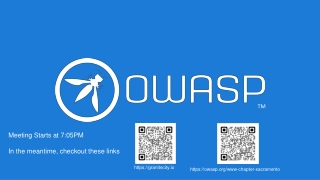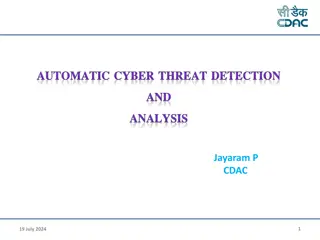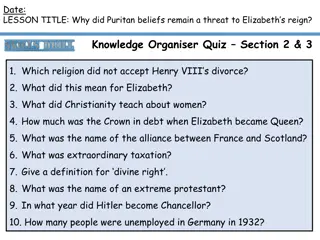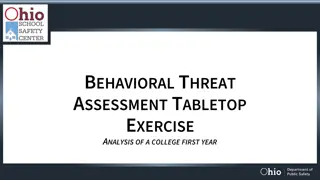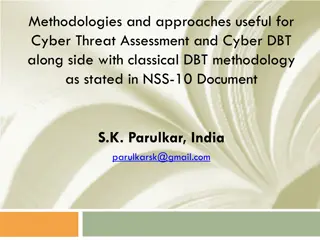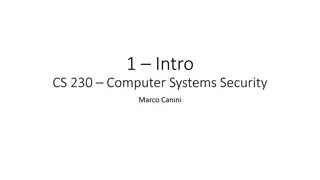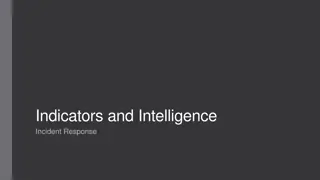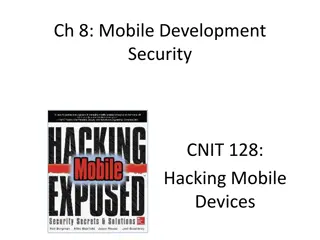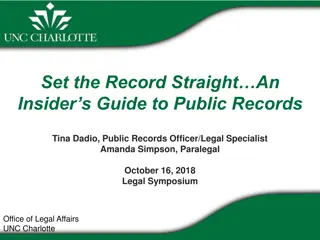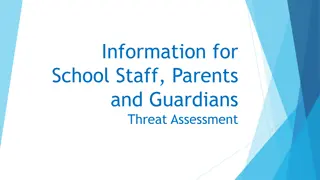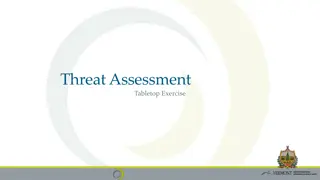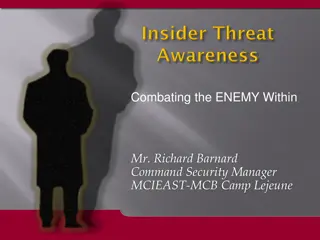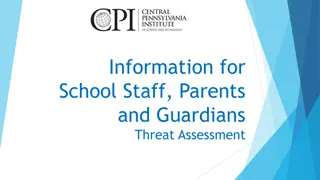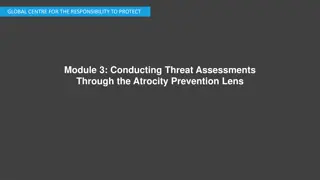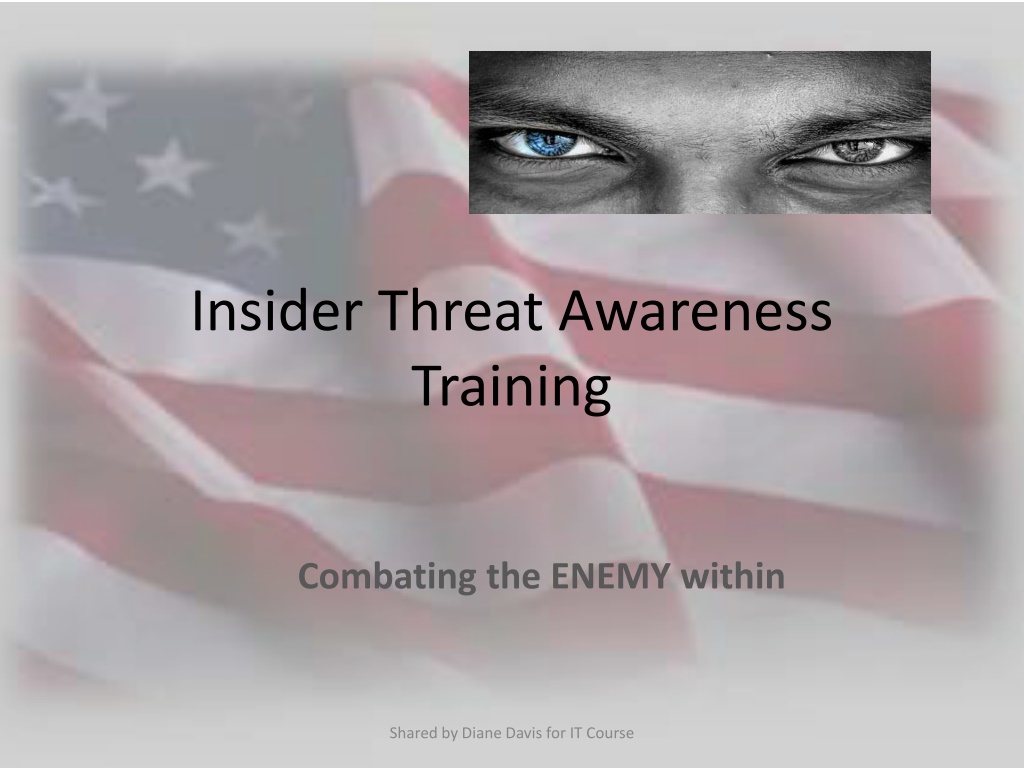
Insider Threat Awareness Training and Characteristics of Spies
Explore the significant impact of insider threats on national security and industry, along with characteristics of spies such as demographics, motivations, and recruitment methods. Understand how to recognize a potential spy and the importance of safeguarding classified information against insider threats.
Download Presentation

Please find below an Image/Link to download the presentation.
The content on the website is provided AS IS for your information and personal use only. It may not be sold, licensed, or shared on other websites without obtaining consent from the author. Download presentation by click this link. If you encounter any issues during the download, it is possible that the publisher has removed the file from their server.
E N D
Presentation Transcript
Insider Threat Awareness Training Combating the ENEMY within Shared by Diane Davis for IT Course
Why is the INSIDER THREAT significant? An insider can have a negative impact on national security and industry resulting in: Loss or compromise of classified, export-controlled, or proprietary information Weapons systems cloned, destroyed, or countered Loss of technological superiority Economic loss Loss of life Shared by Diane Davis for IT Course
What is an INSIDER THREAT? It is a sad reality, but the United States has been betrayed by people holding positions of trust. Arguably, insiders have caused more damage than trained, foreign professional intelligence officers working on behalf of their respective governments. This information is intended to help contractors within the National Industrial Security Program recognize possible indications of espionage being committed by persons entrusted to protect this nation s secrets. Not every suspicious circumstance or behavior represents a spy in our midst, but every situation needs to be examined to determine whether our nation s secrets are at risk. Shared by Diane Davis for IT Course
How Can I Recognize a Spy? SENTENCED: Benjamin Pierce Bishop, 60, confessed to taking home top-secret government documents and sending an email to his girlfriend that included details about a classified meeting with officials about existing war plans. Shared by Diane Davis for IT Course
Characteristics of Spies 93% of the spies were men 20 29 years old was the most common age range for the beginning of an espionage career a) Civilians age 40 or over b) Military personnel in their 20 s 84% of spies were white, 6% black, 5% Hispanic & 5% other 57% were married, 33% Single, and 10% Separated or divorced 15% held a TS/SCI , 35% TS , 21% Secret, 3% Confidential, and 26% had no clearance at all 83% of the spies were born in the U.S. 64% volunteered their espionage services, 15% were recruited by a friend or family member, and only 22% were approached by a foreign Intelligence service 71% of military personnel volunteered to spy versus 57% of civilians who volunteered 69% were motivated by money, 27% were motivated due to revenge toward a current or former employer, 22% motivated by ideology, 12% sought the excitement of the spy lifestyle, and 4% by a compelling need to feel important These statistics were gathered from the Espionage Database Project, an unclassified database maintained by the Defense Personnel Security Research Center (PERSEREC) for stored information on 150 cases going back to 1940 up through 2013. Shared by Diane Davis for IT Course
Counterintelligence Indicators Reportable Behavioral Indicators Disgruntlement with one s employer or the U.S. Government strong enough to make the individual desire revenge. Any statement that, considering who made the statement and under what circumstances, suggests potential conflicting loyalties that may affect handling of classified or other protected information. Active attempt to encourage military or civilian personnel to violate laws, disobey lawful orders or regulations, or disrupt military activities. Knowing memberships in, or attempt to conceal membership in, any group which: 1) advocates the use of force or violence to cause political change within the U.S. 2) has been identified as a front group for foreign interests 3) advocates loyalty to a foreign interest Shared by Diane Davis for IT Course
Counterintelligence Indicators Behavioral Indicators of Information Collection Asking others to obtain or facilitate access to classified or unclassified but protected information to which one does not have authorized access. Does NOT have a NEED TO KNOW . Remotely accesses the computer network while on vacation, sick leave, or at odd times. Unauthorized removal or attempts to remove classified, export-controlled, proprietary or other protected material from the work area. Taking classified materials home or on trips without proper authorization. Working odd hours when others are not in the office, notable enthusiasm about working overtime or on weekends. a logical reason, or visiting work areas after normal hours for no logical reason. Bringing cameras or recording devices, without approval, into areas storing classified or other protected material. Shared by Diane Davis for IT Course
Counterintelligence Indicators Behavioral Indicators of Information Transmittal Short trips to foreign countries, or within the U.S. to cities with foreign facilities, for unusual or unexplained reasons, or that inconsistent with one s apparent interest and financial means. Failure to comply with regulations for reporting foreign contacts or foreign travel. Any attempt to conceal foreign travel or to conceal close and continuing contact with a foreigner, particularly a foreign official. Excessive and/or unexplained use of e-mail or fax Maintaining ongoing personal contact, without prior approval, with diplomatic or other representatives from countries with which one has ethnic, religious, cultural or other emotional ties or obligations, or with employees of competing companies in those countries. Shared by Diane Davis for IT Course
Counterintelligence Indicators Behavioral Indicators of Illegal Income Unexplained affluence, or life-style inconsistent with known income. Includes sudden purchase of high-value items or unusually frequent personal travel which appears to be beyond known income. Sudden repayment of large debts or loans, indicating sudden reversal of financial difficulties. Having a mysterious source of income Shared by Diane Davis for IT Course
Elicitation- What is it? Not all spies sought out to be spies. Some were recruited and others divulged information unknowingly thru elicitation methods. Elicitation - a technique used to discreetly gather information. Elicitation conducted by a skilled collector/elicitor could appear to be a normal social or professional conversation. The victim may never realize she/he was the target of elicitation, totally unaware they may have provided the collector /elicitor with meaningful information. A trained collector/elicitor has a keen understanding of the natural tendencies of human and cultural predispositions and is very clever about how to exploit these. Shared by Diane Davis for IT Course
Elicitation Why it works Reasons elicitors/collectors are so successful because we: have a desire to appear well informed, especially about our profession have a tendency to gossip have a desire to feel appreciated, and belief that we have something important to contribute have a tendency to want to correct others have a tendency to believe others are honest have a tendency to expand on a topic, when we are given praise; to show off have a desire to be polite and helpful to strangers or new acquaintances Shared by Diane Davis for IT Course
Elicitation Techniques 101 The collector/elicitor: May pretend to have knowledge or associations in common with you Will tell an extreme story, in hopes you will want to top it. Will pretend to be ignorant of a topic in order to exploit your tendency to educate them on the topic. Could exploit your instinct to complain or brag, by listening patiently and then validating your feelings Might discuss one topic that may provide insight into a different topic. May repeat core words or concepts to encourage you to expand on what they said Will indicate disbelief or opposition in order to prompt you to offer information in defense of their position. Would say something wrong in the hopes that you will correct their statement with true information. May praise you to coax you into providing information. Shared by Diane Davis for IT Course
Elicitation - How to Deflect You can: Referring the Collector/elicitor to public sources, such as websites, press releases. Ignore any questions or statements you think is improper and change the topic. Deflect a question with one of your own. Respond with, Why do you asks? Give a nondescript answer State that you do not know State that you would have to clear such discussions with your security officer. State that you cannot discuss the matter. Shared by Diane Davis for IT Course
Why do people SPY? Greed or Financial Need: A belief that money can fix anything. Excessive debt or overwhelming expenses. Anger/Revenge: Disgruntlement to the point of wanting to retaliate against the organization. Problems at work: A lack of recognition, disagreements with co-workers or managers, dissatisfaction with the job, a pending layoff. Ideology/Identification: A desire to help the underdog or a particular cause. Divided/Loyalty: Allegiance to another person or company, or to a country besides the United States. Adventure/thrill: Want to ad excitement to their life, intrigued by the clandestine activity, James Bond Wannabe . Vulnerability to blackmail: Extra-marital affairs, gambling, fraud. Ego/Self-image: An rules apply to everyone but me attitude, or desire to repair wounds to their self-esteem. Vulnerability to flattery or the promise of a better job. Often coupled with Ager/Revenge or Adventure/Thrill. Ingratiation: A desire to please or win the approval of someone who could benefit from insider information with the exception of returned favors. Compulsive and destructive behavior: Drug or alcohol abuse, or other addictive behaviors. Family problems: Marital conflicts or separation from loved ones. Shared by Diane Davis for IT Course
Organizational Vulnerabilities Having a solid security operations program in your organization is worthless if the program is not enforced. You may as well give the thieves the keys to the castle , as it is said. Examples of Organizational vulnerabilities : Not labeling proprietary or classified information correctly or not labeling it at all. Making it easy for someone to exit the facility (or network system) with proprietary, classified or other protected materials. Not having defined policies regarding working from home on projects of a sensitive or proprietary nature. Giving the perception that security is relaxed and the consequences for theft are minimal or non-existent. Not training employees properly on how to protect proprietary information. Time pressure: employees who are rushed may inadequately secure proprietary or protected materials, or not fully consider the consequences of their actions. Shared by Diane Davis for IT Course
What can I do to help prevent espionage? Being forever vigilant is the key in protecting Information, operations, facilities and people. Your role is to be aware of potential issues and to exercise good judgment in determining what and when to report. Looking away, will not make it go away. We must get more involved in protecting our organization in the interest of national security. We need to and becoming proactive versus reactive to protect a co-worker from his/her own potentially self-destructive behavior. If you a co-worker s behavior raises concerns that merit reporting to your FSO, it is your obligation to do so. All reports will be checked out with the utmost confidentially and discretion. Shared by Diane Davis for IT Course
Presidential Executive Order# 12968 ACCESS TO CLASSIFIED INFORMATION THE WHITE HOUSE Office of the Press Secretary For Immediate Release -- August 4, 1995 According to the Presidential Executive Order# 12968 on Access to Classified Information under Sec. 6.2. Employee Responsibilities it states, Employees are encouraged and expected to report any information that raises doubts as to whether another employee's continued eligibility for access to classified information is clearly consistent with the national security. Shared by Diane Davis for IT Course
Edward Snowden I ve got some stuff you might be interested in. With that simple message, sent in December 2012 from former NSA contractor Edward Snowden to Guardian reporter Glenn Greenwald, the biggest leak of government secrets in history was set in motion. Shared by Diane Davis for IT Course
Pfc. Bradley Manning A military judge on Wednesday sentenced Pfc. Bradley Manning to 35 years in prison, bringing to a close the government s determined pursuit of the Army intelligence analyst who leaked the largest cache of classified documents in U.S. history. Shared by Diane Davis for IT Course
DSS defines insider threat as: Acts of commission or omission by an insider who intentionally or unintentionally compromises or potentially compromises DoD s ability to accomplish its mission. These acts include, but are not limited to, espionage, unauthorized disclosure of information, and any other activity resulting in the loss or degradation of departmental resources or capabilities. A former FBI agent, Earl Pitts had been charged with selling U.S. intelligence secrets to the Russians for payments in excess of $224,000 from 1987 to 1992. On June 27, 1997, Earl Pitts was sentenced by a federal judge to 27 years in prison for spying for Moscow both before and after the fall of the Soviet Union. http://ts2.mm.bing.net/th?id=H.5046059443161073w=177h=165c=7rs=1pid=1.7 Shared by Diane Davis for IT Course
On 21 September 2001, the FBI arrested Ana Belen Montes, a US citizen born 28 February 1957, on a US military installation in Nurnberg, Germany. On 19 March 2002, she pleaded guilty to espionage in U.S. District Court in Washington, DC, and admitted that, for 16 years, she had passed top secret information to Cuban intelligence. She received 25 years in prison. ANA BELEN MONTES Anna Belen Montes (Born February 28, 1957) born in West Germany, where her father, Alberto Montes, was posted as an Army doctor. The family later lived in Topeka, Kansas and later Towson, Maryland, where she graduated from Loch Raven High School in 1975. In 1979 she earned a degree in foreign affairs from the University of Virginia, and in 1988 she finished a master's degree at Johns Hopkins University School of Advanced International Studies. Montes graduated with a major in Foreign Affairs from the University of Virginia in 1979 and obtained a Masters Degree from the Johns Hopkins University School of Advanced International Studies in 1988. She is single and lived alone at 3039 Macomb Street, NW, apartment 20, Washington, DC. Until her arrest, Montes was employed by the Defense Intelligence Agency (DIA) as a senior intelligence analyst. She began her employment with DIA in September 1985 and since 1992 has specialized in Cuba matters. She worked at Bolling Air Force Base in Washington, DC. Prior to joining DIA, Montes worked at the Department of Justice. In 1993, she traveled to Cuba to study the Cuban military on a CIA-paid study for the Center for the Study of Intelligence. Shared by Diane Davis for IT Course
Robert Philip Hanssen (born April 18, 1944) an American former Federal Bureau of Investigation (FBI) agent who spied for the Soviet and Russian intelligence services against the United States for 22 years from 1979 to 2001. Hanssen was arrested on February 18, 2001 near his home in Vienna Virginia, and was charged with selling American secrets to the USSR and subsequently Russia for more than US$1.4 million in cash and diamonds over a 22-year period. On July 6, 2001, he pleaded guilty to 13 counts of espionage. He was then sentenced to life in prison without the possibility of parole. His activities have been described by the U.S. Department of Justice s Commission for the Review of FBI Security Programs as "possibly the worst intelligence disaster in U.S. history Shared by Diane Davis for IT Course
Robert Patrick Hoffman II, a 20-year veteran who retired in November 2011 as a petty officer first class was a cryptologic technician in the Navy. The former sailor pled not guilty to additional charges that he passed top secret documents to individuals he believed represented the Russian government. Robert a Virginia Beach resident, entered his plea in federal court in Norfolk. Hoffman was charged with attempted espionage in December of 2012. Prosecutors filed a superseding indictment stating Hoffman attempted to hand over top secret documents that warned of U.S. capabilities to track foreign ships. Previously, Hoffman was charged with only passing along secret documents that detailed how to track U.S. submarines. The indictment says Hoffman actually delivered the information to the FBI, which was conducting an undercover operation. Shared by Diane Davis for IT Course
How BIG is the problem? Spies have been damaging U.S. national interests since the American Revolution with Benedict Arnold. But many things about today s world make the opportunity to commit espionage from within even easier: Increase in the number of personnel with access to sensitive information Ease of transmitting information (e.g., the Internet) Growing demand for sensitive information from multiple customers Shared by Diane Davis for IT Course
Presidential Executive Order# 12968 ACCESS TO CLASSIFIED INFORMATION THE WHITE HOUSE Office of the Press Secretary For Immediate Release -- August 4, 1995 EXECUTIVE ORDER #12968 ACCESS TO CLASSIFIED INFORMATION The national interest requires that certain information be maintained in confidence through a system of classification in order to protect our citizens, our democratic institutions, and our participation within the community of nations. The unauthorized disclosure of information classified in the national interest can cause irreparable damage to the national security and loss of human life. Security policies designed to protect classified information must ensure consistent, cost effective, and efficient protection of our Nation's classified information, while providing fair and equitable treatment to those Americans upon whom we rely to guard our national security. This order establishes a uniform Federal personnel security program for employees who will be considered for initial or continued access to classified information. Sec. 6.2. Employee Responsibilities. (a) Employees who are granted eligibility for access to classified information shall: (1) protect classified information in their custody from unauthorized disclosure; (2) report all contacts with persons, including foreign nationals, who seek in any way to obtain unauthorized access to classified information; (3) report all violations of security regulations to the appropriate security officials; and (4) comply with all other security requirements set forth in this order and its implementing regulations. (b) Employees are encouraged and expected to report any information that raises doubts as to whether another employee's continued eligibility for access to classified information is clearly consistent with the national security. Shared by Diane Davis for IT Course
How do you recognize an INSIDER THREAT? Shared by Diane Davis for IT Course
Aldrich Hazen Ames (born May 26, 1941) Ames started his initial career with the CIA in 1957 during his sophomore year at the McLean High School, in McLean VA, working three summers as a low-ranking (GS-3) records analyst, marking classified documents for filing. In 1969 Ames was accepted into the CIA Career Trainee Program despite several alcohol-related brushes with the police. Aldrich Ames quickly moved up the ranks in the CIA by 1983. Having mastered the Russian language and his studies specializing in the Russian intelligence services, he became a high-ranking CIA employee - the chief of counter intelligence in Eastern Europe and the Soviet Union - who spied for the Soviet Union from 1985 to 1994. In 1986 and 1991, Ames passed two polygraph examinations during the time has was spying for the Soviet Union and Russia. And in November 1989, a fellow employee reported that Ames seemed to be enjoying a lifestyle well beyond the means of a CIA officer and that his wife's family was less wealthy than he had claimed. Nevertheless, the CIA moved slowly. When the investigator assigned to Ames's finances began a two-month training course, no one immediately replaced him. During the time he spied for the KGB, Ames had received over $4.6 million from the Soviets working in CIA counter-intelligence. Though he declared an annual income of $60,000, his credit card spending of up to $30,000 a month funded a lifestyle that included a new Jaguar and a $540,000 house, paid for in cash. Aldrich Ames Shared by Diane Davis for IT Course
Potential Espionage Indicators: Failure to report overseas travel or contact with foreign nationals Seeking to gain higher clearance or expand access outside the job scope Engaging in classified conversations without a need to know Working hours inconsistent with job assignment or insistence on working in private Exploitable behavior traits Repeated security violations Attempting to enter areas not granted access to Not every person who exhibits one or more of these indicators is involved with illicit behavior, but most of the persons who have been involved with espionage were later found to have displayed one or more of these indicators. Shared by Diane Davis for IT Course
Commonalities of those who have committed espionage since 1950: More than 1/3 of those who committed espionage had no security clearance Twice as many insiders volunteered as were recruited 1/3 of those who committed espionage were naturalized U.S. citizens Most recent spies acted alone Nearly 85% passed information before being caught Out of the 11 most recent cases, 90% used computers while conducting espionage and 2/3 used the Internet to initiate contact Shared by Diane Davis for IT Course
How can YOU help? You are the first line of defense against espionage. Help protect our national security by reporting any suspicious behavior that may be related to a potential compromise of classified information. Shared by Diane Davis for IT Course
Reportable Behaviors Shared by Diane Davis for IT Course
Information Collection: Keeping classified materials in an unauthorized location Attempting to access sensitive information without authorization Obtaining access to sensitive information inconsistent with present duty requirements Shared by Diane Davis for IT Course
Information Transmittal: Using an unclassified medium to transmit classified materials Discussing classified materials on a non-secure telephone Removing classification markings from documents Shared by Diane Davis for IT Course
Additional Suspicious Behaviors: Repeated or un-required work outside of normal duty hours Sudden reversal of financial situation or a sudden repayment of large debts or loans Attempting to conceal foreign travel Shared by Diane Davis for IT Course
It is better to have reported overzealously than never to have reported at all. Report suspicious activity to your Facility Security Officer References - Defense Security Service Washington Post World wide Web Shared by Diane Davis for IT Course

